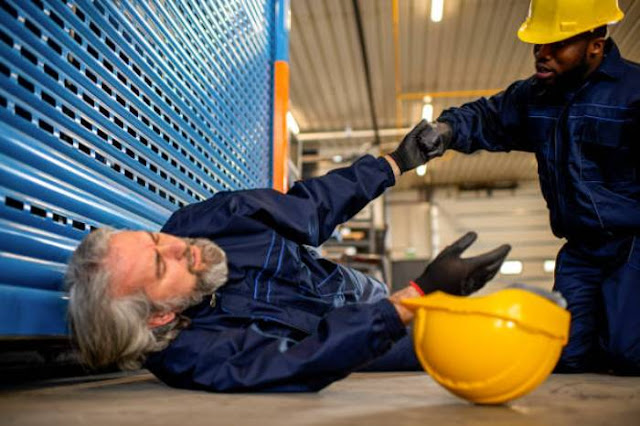
Normal Wounds in Slip and Fall Mishaps at Places of work:
Injuries and Strains: These are among the most common wounds
in slip and fall mishaps. An individual could contort a lower leg, strain a
muscle, or experience a hyper-extended wrist because of the fall.
Cracks: Falls can prompt broken bones with breaks in the
wrist, arm, lower leg, and hip being especially normal.
Head Wounds: Assuming the head is affected throughout the
fall, it can bring about blackouts, wounds, or more extreme horrible cerebrum
wounds (TBIs).
Back and Spinal Line Wounds: Falls can prompt wounds toward
the back and spinal string, possibly causing long haul harm and disabilities.
Cuts and Scraped spots: The effect of a fall can cause cuts,
scratches, and scraped areas, which might shift in seriousness.
Injuries and Injuries: Injuries happen when veins underneath
the skin burst because of the effect of the fall.
Inner Wounds: at times, a fall can prompt interior wounds,
for example, organ harm or inward dying, which may not be quickly obvious.
Post-Horrendous Pressure Problem (PTSD): For people who
experience serious falls, PTSD might create as a mental reaction to the
horrible mishap.
Reasons for Slip and Fall Mishaps at Places of work:
A few variables add to slip and fall mishaps at places of
work. Recognizing these causes is urgent for forestalling such occurrences:
Wet or Elusive Surfaces: Spills, breaks, and wet floors are
normal offenders in slip and fall mishaps. These risks can happen in an
assortment of work environment settings, including kitchens, processing plants,
and building locales.
Lopsided Deck: Unpredictable or lopsided deck surfaces can
represent a stumbling peril. This can incorporate broke or harmed concrete,
lopsided tiles, or broken down rugs.
Absence of Legitimate Lighting: Lacking lighting can make it
hard for workers to distinguish likely perils in their way, expanding the
gamble of a slip and fall mishap.
Absence of Handrails: Flights of stairs, inclines, and
raised walkways without handrails or guardrails can be especially hazardous.
Jumbled Workspaces: Work areas jumbled with devices,
hardware, or trash can block pathways and increment the gamble of falls.
Lacking Signage: Inability to put advance notice signs close
to wet or elusive regions can prompt mishaps, as people may not know about the
risk.
Ill-advised Footwear: Representatives who don't wear
suitable footwear for their workplace, for example, non-slip shoes, are more
defenseless to slipping and falling.
Weather patterns: Outside places of work can be impacted by
unfavorable atmospheric conditions like downpour, ice, or snow, making surfaces
dangerous and unsafe.
Forestalling Slip and Fall Mishaps at Places of work:
Forestalling slip and fall mishaps is a common obligation
among businesses and representatives. Here are a few fundamental preventive
measures:
Normal Reviews: Bosses ought to lead standard assessments of
the working environment to recognize and address possible perils. This
incorporates fixing lopsided ground surface, quickly tidying up spills, and
keeping up with legitimate lighting.
Representative Preparation: Businesses ought to give far
reaching preparing to workers on recognizing and tending to slip and fall
dangers. This might incorporate showing legitimate methodology for tidying up
spills and the significance of wearing reasonable footwear.
Appropriate Signage: Guarantee that wet or elusive regions
are obviously set apart with advance notice signs. These signs ought to be
effectively noticeable to all workers.
Utilization of Individual Defensive Gear (PPE):
Representatives ought to utilize suitable PPE, including non-slip shoes or
boots, to decrease the gamble of slipping and falling.
Safe Flights of stairs and Walkways: Flights of stairs and
raised walkways ought to have handrails and guardrails for added wellbeing.
These designs ought to be reviewed routinely and kept up with on a case by case
basis.
Neatness and Association: Keep workspaces spotless and
coordinated. Devices and hardware ought to be put away in assigned regions, and
mess ought to be limited.
Climate Contemplations: During antagonistic weather
patterns, avoid potential risk. Clear walkways of snow and ice and give salt or
sand to footing.
Detailing Systems: Managers ought to lay out clear
announcing strategies for slip and fall occurrences. Workers ought to quickly
report any mishaps or risks they experience.
Crisis Reaction: Execute a crisis reaction plan for tending
to slip and fall mishaps. Guarantee that emergency treatment supplies and
prepared work force are promptly accessible.
Legitimate Ramifications and Pay:
In case of a slip and fall mishap at a place of work, there
might be legitimate ramifications. The harmed party might be qualified for pay
for clinical costs, lost wages, torment and enduring, and different harms.
Laborers' remuneration protection commonly covers such mishaps, yet the
particular regulations and guidelines can shift by area.
It's fundamental for the two managers and representatives to
know about their expectations in the event of a slip and fall episode. Looking
for lawful counsel or talking with the fitting specialists can assist people
with exploring the legitimate parts of these mishaps.
All in all, slip and fall mishaps at places of work can
bring about a scope of wounds, from minor injuries to additional extreme breaks
and head wounds. Counteraction is vital, and it requires a blend of persistent
manager rehearses, representative mindfulness, and adherence to somewhere safe
and secure conventions. By recognizing and tending to expected perils and
keeping a protected workplace, the gamble of slip and fall mishaps can be
fundamentally diminished, encouraging a more secure and more useful work
environment for all.



